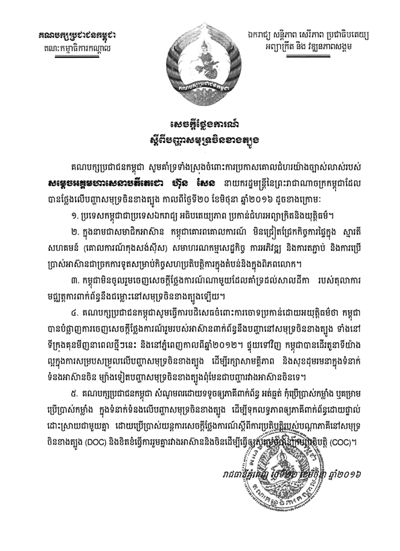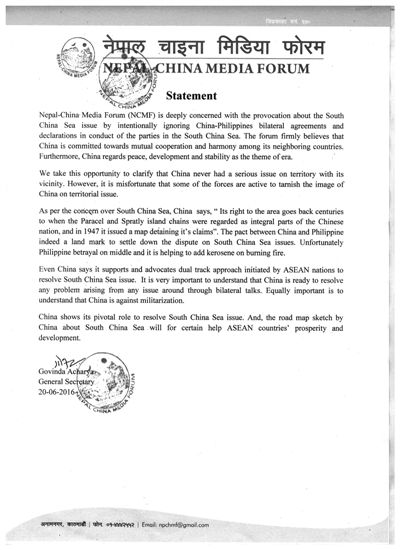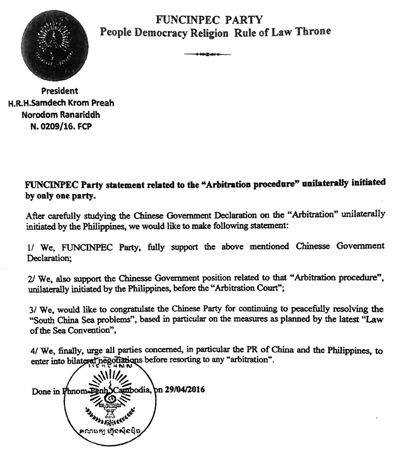The international community widely supports China’s stance of maintaining stability in the South China Sea.




▲ Cambodian People’s Party: The Cambodian People’s Party supports Cambodian Prime Minister Hun Sen’s statement on the South China Sea issue. Do not participate in any statement supporting the arbitral tribunal’s ruling on the South China Sea dispute. The South China Sea issue is not between ASEAN and China.
The Cambodian People’s Party insists on urging the parties concerned to exercise restraint on the South China Sea issue and not to use force or threaten to use force, so that the direct parties can use the mechanism of the Declaration on the Conduct of Parties in the South China Sea to solve the problem and make joint efforts to push ASEAN and China to reach a Code of Conduct in the South China Sea.

▲ Abbas Zaqi, member of the Palestinian Fatah Central Committee and Minister of Arab Relations and China Affairs: Fatah believes that friendly China is on the side of truth, supports China’s sovereignty in the South China Sea, and firmly believes that China is committed to consolidating the foundation of truth and justice in line with the principled position of peaceful settlement of disputes, safeguarding justice, tolerance and cooperation, and achieving mutual benefit and win-win through reviving the world economy, especially the economies of countries in the South China Sea. Fatah called on the countries concerned in the South China Sea to eliminate external interference and resolve possible differences through direct peace negotiations. External interference will only escalate disputes and aggravate the tension between countries in the region. China has demonstrated her belief in peaceful coexistence and resolving disputes through peaceful means rather than war through practical actions.

▲ Helal Helal, Deputy Secretary of Regional Leadership of the Syrian ruling Arab Baath Socialist Party: The Syrian people and the Arab public are worried about the situation in the South China Sea. Regrettably, the South China Sea is developing towards militarization and opening its doors to external interference. Encouraged by hegemonic forces accustomed to trampling on international law, the actions of relevant parties are undermining the stability and cooperation in the South China Sea and infringing on China’s territorial and island sovereignty. What happened in the South China Sea is another example of hegemonism, interventionism and violation of other countries’ sovereignty … …


▲ Nepal — Gofenda Achaya, Secretary-General of China Media Forum: The-China Media Forum expressed deep concern about the Philippine side’s subjective neglect of the bilateral agreement between China and the Philippines and the Declaration on the Conduct of Parties in the South China Sea and its provocation of the South China Sea issue. The agreement signed between China and the Philippines is a good benchmark for resolving the dispute between China and the Philippines over the South China Sea issue. Unfortunately, the Philippines violated the relevant consensus between China and the Philippines on the South China Sea issue and added fuel to the fire. China has made it clear that it agrees with and advocates the "two-track thinking" put forward by ASEAN countries to deal with problems, so it is very important to understand that China is willing to solve any problems raised through bilateral dialogue. It is equally important to understand that China does not support the militarization of the South China Sea issue. China has demonstrated its key role in dealing with the South China Sea issue. The road map of the South China Sea drawn by China will certainly contribute to the development and prosperity of ASEAN countries.

▲ funcinpec party, Cambodia: After carefully studying the position paper of the China government on the Philippine unilateral arbitration case in the South China Sea, our party would like to make the following statement: funcinpec party fully supports the above position of the China government; We appreciate China’s insistence on promoting the settlement of disputes in the South China Sea by peaceful means, especially on the basis of the relevant principles of the United Nations Convention on the Law of the Sea; We call on all parties concerned, especially China and the Philippines, to hold bilateral consultations before resorting to any arbitration.


As of June 30, nearly 130 foreign political parties and organizations from Asia, Europe, Africa, Latin America and Oceania have actively expressed their support for China’s position on the South China Sea issue, believing that China’s exclusionary declaration on arbitration in accordance with the United Nations Convention on the Law of the Sea is exercising its legitimate rights and calling on the parties to resolve disputes directly through negotiations and consultations to maintain regional peace and stability.
Kaz Ahmed, Senior Assistant Secretary of bangladesh awami league Central Working Committee and Congressman:
Bangladeshi firmly believes that China has always upheld the position of safeguarding freedom of navigation and stability in the South China Sea, and has always adopted peaceful methods to find a solution. We believe that countries in the region are fully capable of solving this problem in a friendly and peaceful way. I hope all parties concerned can show restraint and reason.
We also believe that this issue should be solved by the relevant countries through bilateral direct consultation and communication, and external forces should not interfere. All countries involved in the South China Sea dispute should resolve it through peaceful means to ensure that the freedom and stability of navigation in the South China Sea are not undermined.
The South China Sea is a very important trade channel in this region. Except for the countries concerned, the products and trade of many other countries have to be transported to the countries concerned through the South China Sea, so we hope that the countries concerned will continue to solve this problem in a peaceful way.
We always believe that China’s actions are beneficial to the peaceful development of the region, and we hope that such an attitude can be followed by more countries so that we can create greater benefits for peace and stability in the region.
Professor Kony Buckley, University of Indonesia:
Disputes over sovereignty should be resolved through direct negotiations between the claimant countries, and regional security should be jointly safeguarded by ASEAN and China. Only China and the Philippines really know what the problem is, so disputes in the South China Sea should be resolved bilaterally, not multilaterally or internationally. The Philippines is a member of ASEAN, and ASEAN will be pleased if the Philippines and China can talk.
Ibrahim Ismail, member of the National Executive Committee of the South African ANC and the Central Foreign Affairs Subcommittee:
The core principle of South Africa’s foreign policy is that the problems of African countries should be solved through African solutions. Before that, they were interfered by foreign forces and international forces. Any interference from foreign forces will always bring disaster. We believe that if there is a problem in the South China Sea, it should be solved directly by the countries concerned through consultation, and should not be interfered by external forces.
We encourage and call on all parties to maintain peace and stability in the South China Sea, and all countries should cooperate to reach friendly solutions through cooperation and dialogue for the benefit of all countries in the region.
Nassar Gaddafi, member of the Central Executive Committee of Uganda National Resistance Movement and Chairman of the Youth League:
If there is a dispute between the two sides, it needs to be resolved through dialogue and negotiation and diplomatic efforts. China also expressed the hope that one-on-one consultation and negotiation would be held with the Philippines to solve this problem.
Neighboring countries cannot be chosen, and it is not a good option for the Philippines to seek international arbitration. China hopes to reach a common understanding with the Philippines through direct exchanges, which is something worth considering and doing.
The maritime territorial dispute between China and the Philippines is not the first case in the world, and there are similar disputes in other regions. Although they may have different ideas and ideas, as long as we sit down together to discuss and consider the solutions, we will definitely realize that we need each other’s support in the end.
I also urge the Philippines to respond positively to China and listen more to China. We need to sit down together to solve this problem through diplomatic efforts and through this good-neighborly and friendly relationship between the two sides.
Cveta Novo, Vice Chairman of Bulgarian Citizens Party for European Progress:
Disputes in the South China Sea should be resolved through peaceful means such as dialogue, consultation and negotiation, and should not be resolved by other means. When there is a dispute, it is best for the parties concerned to solve it through their own efforts or within the regional scope. The outside world should also encourage dialogue, consultation and negotiation to solve disputes, not other ways.
Former Romanian Prime Minister victor ponta:
Problems between friends and neighbors should be solved through friendly dialogue. Conflicts between European countries are also resolved through dialogue, rather than resorting to international courts. Extraterritorial countries in the South China Sea should help the parties return to the track of fair dialogue and properly solve the problem.
President of the International Crisis Group and former UN Under-Secretary-General Geno:
At present, the South China Sea issue is far from being a crisis. The United Nations Convention on the Law of the Sea is not responsible for ruling on sovereignty issues, and sovereignty disputes between China and other countries should be settled through consultation, rather than resorting to the Convention. If negotiation fails, the dispute can be put on hold for the time being. All parties concerned should find effective ways to ease the tension in the South China Sea and avoid escalating into a crisis.
Upendra gautam, Secretary General of Nepalese China Research Center:
China’s "dual-track thinking" in dealing with the South China Sea issue is legal and reasonable. This line of thinking points out that relevant disputes should be properly settled by the countries directly concerned through negotiation and consultation, which is the basic framework for China and ASEAN countries to jointly safeguard peace and stability in the South China Sea. The international community, especially China’s neighbors, should support this "two-track thinking" and contribute to peace in the South China Sea.
Calbi Hashim, General Secretary of the Sri Lankan United Nationalist Party and Minister of State-owned Enterprise Development:
Sri Lanka believes that regional affairs should be decided by countries in the region through consultation and should not be interfered and influenced by foreign forces. Disputes over territorial waters should be settled by both parties involved through bilateral channels. Disputes over the South China Sea should be settled by China and the countries concerned through bilateral channels. China is an important force for maintaining peace and development in the region. believes that the governments of the Communist Party of China (CPC) and China will play a more active role in the peace and development of the region.
Joyce Molopa, Member of the Political Bureau of communist party, South Africa:
We see that China hopes to solve the problem by peaceful means and avoid any conflict. Even though China has become an economic power, it still maintains a humble attitude and resolves disputes by peaceful and negotiated means instead of resorting to war. China’s approach is correct. China has repeatedly said that the door to dialogue has been open to the Philippines, hoping that the new Philippine president will accept the proposal put forward by China and sit down and solve the problem through friendly negotiations.
Anthony Joseph, Secretary of Civil and Enterprise Organizations of Sudan People’s Liberation Movement in South Sudan:
We appreciate China’s adherence to peaceful negotiation to solve the problem, which can avoid the region falling into an unstable situation. The new leader of the Philippines should realize that international arbitration may take years and disrupt regional stability. The Philippine side should focus on peace and properly handle the issue from the interests of the two countries and Asia.
Nabil Zazi, member of the Political Bureau and official spokesman of the Egyptian National Progressive Unity Group:
Recently, with the support of foreign forces, the Philippines has launched a series of harassment actions against China. Extraterritorial powers hope to provoke a new cold war in the region and exert greater political and economic pressure on China. Historical facts show that China has exercised sovereignty over the South China Sea Islands since ancient times, including conducting military patrols and establishing rescue centers. China’s sovereignty over the South China Sea Islands has been recognized by the international community. Maps issued by many countries also recognize China’s sovereignty over these islands.
The purpose of this extraterritorial power to get its hands on the Middle East is to occupy the rich oil and gas resources in this region, as well as the South China Sea issue. Our Party resolutely opposes this conspiracy in many parts of the world, supports friendly China, opposes resorting to compulsory international arbitration on the South China Sea issue, and opposes attempts by relevant parties to infiltrate China’s historical territory and territorial waters.
Mora, Vice Chairman of the European Left Party:
China’s position and policy on the South China Sea issue are correct. China has always insisted on relying on relevant parties to resolve disputes, and external forces should not interfere. Internationalizing the South China Sea issue is a "serious mistake". Many problems may not have good results or even be solved after internationalization or recourse to international arbitration. The South China Sea issue should be resolved by all parties concerned, instead of resorting to international arbitration.
President communist party of bohemia and moravia and Deputy Speaker of the Czech House of Representatives Vojtech Philippe:
Only when bilateral negotiations fail to solve the problem can the two sides jointly file an arbitration request with the International Court of Justice, and cannot unilaterally file an international lawsuit. Moreover, China made a exclusionary declaration in accordance with Article 298 of the United Nations Convention on the Law of the Sea as early as 2006, so there is no possibility of solving the South China Sea issue by international litigation.
Shaker, the representative of Slovenia’s modern middle party:
Sri Lanka fully understands and supports China’s position on the South China Sea arbitration case, and hopes that relevant parties can resolve their differences through consultation, dialogue and peaceful negotiation. Neighboring countries should strengthen good-neighborly relations and resolve their disputes through peaceful dialogue, which is also an effective way to solve international and regional disputes.
Stephen Perry, Chairman of 48 British Group Clubs:
Arbitration requires both parties to accept the principle of arbitration. As the two parties have not reached an agreement on arbitration, this arbitration is flawed. The United States demands, or insists, that China accept the award of the arbitration institution, but the United States itself does not recognize this arbitration institution because of its legal basis — — The United Nations Convention on the Law of the Sea has not been ratified in the United States. Therefore, the argument that this arbitration involves the concept of the rule of law cannot stand scrutiny.
Marvao Sudaha, President of the International Association of Arab Writers and Journalists Friends of China:
Fundamentally speaking, the so-called "maritime dispute" does not exist. No matter from the historical, legal or sovereign level, China has had sovereignty in this sea area since ancient times. Therefore, China cannot accept the internationalization of discussions on its territory and islands with absolute sovereignty, nor can it accept the internationalization of issues involving its security interests.
Our Party firmly supports all China’s positions and statements on the South China Sea issue, supports all parties concerned to resolve disputes peacefully through negotiation and consultation, and opposes other countries using the South China Sea issue to interfere in China’s sovereignty.
— — Nepal agricultural workers’ party
Our Party believes that peace and stability in the South China Sea should be jointly maintained by China and ASEAN countries, which is in line with international law and practice. Our party resolutely opposes the militarization of the South China Sea or the intervention of external forces, and adheres to the principle of settling disputes in various regions of the world through peaceful negotiations by the parties concerned, so as to prevent external forces from interfering in the interests of arms dealers and open the door for the development and growth of mercenary gangs and terrorist organizations.
— — Egyptian communist party
Recently, all kinds of claims that China has accepted international arbitration on the South China Sea issue are violations of China’s sovereignty, which are inconsistent with the facts, causing damage to the actions of all countries in the world to safeguard sovereignty and undermining international law. Its essence is to force China to recognize and accept international arbitration by imposing things that are not conducive to China’s sovereignty and interests. This is unrealistic, imprecise and unwise.
We find that the South China Sea issue has attracted the attention of the international community because there is a hand behind it. Beating around the bush on legal issues is to serve the interests of some foreign countries so that they can expand their territory and oceans. China, of course, does not accept or acknowledge the game.
— — Ghanaian writer Tariq Isag
All historical and realistic evidences show that China has sovereignty over Nansha Islands and its adjacent waters. It is ridiculous to resort to international arbitration for the South China Sea issue, which is the embodiment of neo-colonialism of some extraterritorial forces. Their attempt will not succeed. We support China’s position on the South China Sea issue and China’s sovereignty and territorial integrity.
— — Jordanian writer Tasneem Farah
The international community has long recognized China’s sovereignty over the South China Sea Islands. Since the second half of the 19th century, documents from Britain, France and other countries have recorded China’s activities on the South Island Reef such as Nansha Islands. Any country that refuses to recognize the South China Sea Islands as China is refusing to recognize the norms of history and international law.
The illegal occupation of the South Island Reef in China by the Philippines and other countries is the essence of the South China Sea issue. The Philippines’ unilateral submission of the South China Sea issue to international arbitration not only violates international law, but also violates the relevant consensus reached with China. The arbitral tribunal is deeply influenced by some foreign powers and is likely to make an unfair judgment. China’s exclusionary declaration on arbitration in accordance with the United Nations Convention on the Law of the Sea is an exercise of legitimate rights.
— — Mauritanian writer Abdulatif Said Mohamed Abdouwudud
The South China Sea issue is not a new one, let alone one provoked by China. In the 1970s, the Philippines had violated international law and the basic norms of international relations, including the Charter of the United Nations, illegally occupied some islands and reefs in the South China Sea of China, and built facilities and deployed weapons. What the Philippines has done has seriously threatened regional peace and stability, and threatened China’s sovereignty and territorial integrity.
China is a peace-loving country, and has always advocated the settlement of disputes between countries through peaceful means. However, the Philippines, instigated by external forces, refused to settle the dispute through peaceful negotiation in an attempt to solve the problem by submitting it to international arbitration. Some extraterritorial countries are manipulating the Philippines’ actions behind the scenes.
History has proved that despite its strong national strength, China has never invaded any neighboring country, and China is a peace-loving country. China has sufficient strength in military, economy and personnel, but at the same time, it also has calm wisdom to properly handle problems and is cautious in making important decisions. China will never allow anyone to violate its national sovereignty, independence and territorial integrity, and all countries in the world should firmly stand by China.
— — Iraqi writer Baha Manya
On the South China Sea issue, China has released many positive signals, which deserve careful study by the Philippines. These signals include settling disputes by peaceful negotiation, shelving disputes, joint development and "two-track thinking". Among them, shelving disputes and joint development are the direction and general trend of resolving maritime and island disputes in the future, and China and the Philippines should work towards this goal.
— — Tang Zhimin, Dean of International College of Chia Tai School of Management, Thailand
(This edition is provided by the International Liaison Department of the CPC Central Committee)
Cartography: Zhang Fangman